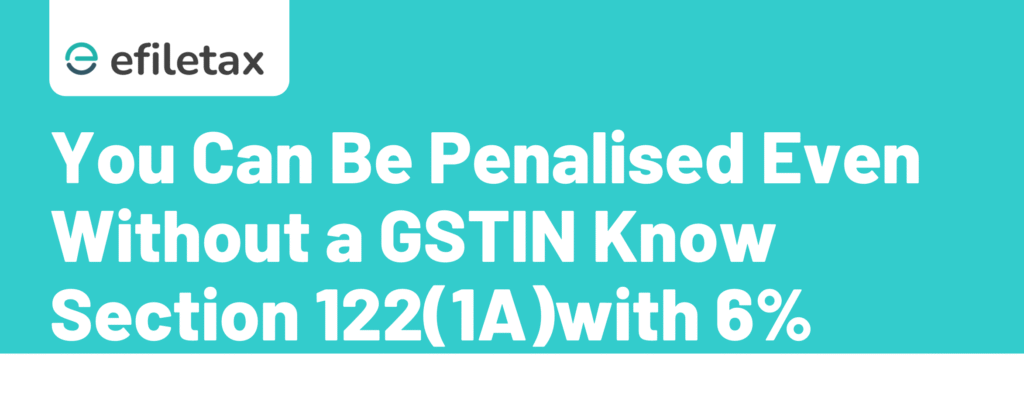
Introduction
Even third parties—consultants, transporters, or brokers—can face fines if they help in GST fraud. This blog breaks down who’s covered, what acts trigger the penalty, and how to stay safe.
Who Can Be Penalised Under Section 122(1A)?
Unlike Section 122(1), which targets registered persons, Section 122(1A) expands the net.
Applies to:
- Any person (registered or unregistered)
- Even if not directly filing GST returns
- Intermediaries, agents, consultants, brokers, transporters, etc.
Key Offences That Attract Penalty
Examples include assisting in:
- Issuing fake invoices
- Availing ineligible ITC
- Transporting or storing goods without valid documents
- Supplying goods without issuing invoice
- Falsifying accounts or documents
Quantum of Penalty: What You Risk Paying
| Offender Type | Penalty Under Section 122(1A) |
|---|---|
| Any person aiding GST fraud | ₹25,000 or tax evaded, whichever is higher |
This is in addition to penalty under Section 122(1) levied on the main accused.
Key Legal Backing and Notifications
- CGST Act, Section 122(1A): Introduced by Finance Act, 2020, effective from 01.01.2021
- CBIC Clarifications: In various fraud-related cases, CBIC has relied on this section to book agents and enablers
- Delhi HC in Siddharth v. State (2021): Observed that aiding tax evasion via bogus firms may invoke 122(1A) and 132 simultaneously
Expert View: Why Professionals Must Be Cautious
Tax consultants and CA firms advising clients on GST compliance must exercise due diligence.
Tip:
Always verify GSTINs, nature of supply, and documentary trail before drafting invoices or filing returns.
How to Avoid Section 122(1A) Penalty
- Verify clients and their transactions
- Avoid circular trading or false invoicing
- Do not lend credentials or bank accounts
- Transporters: Ensure e-way bills are valid
- Accountants: Keep audit trails and avoid backdated entries
Subheading with Keyphrase
When does penalty under Section 122(1A) of CGST Act apply?
The penalty applies only when the person:
- Knowingly helps another in committing a fraud
- Engages in an act that leads to a violation under Section 122(1)
- Is not already covered under 122(1)
FAQs on Section 122(1A) of CGST Act
Q1. Can an unregistered transporter be penalised under Section 122(1A)?
Yes. If they knowingly move goods without valid GST documents, they fall under its scope.
Q2. What if a person unknowingly helps in GST evasion?
The term “knowingly” is key. If intent cannot be proven, penalty may not apply. But ignorance is not always a defence.
Q3. Can penalty under Section 122(1A) be imposed along with prosecution?
Yes. If the evasion exceeds ₹5 crore, Section 132 (prosecution) may also be invoked.
Summary
Section 122(1A) of CGST Act penalises any person who knowingly assists in GST fraud, even if unregistered. This includes aiding fake invoicing, bogus ITC, or illegal transport. Penalty is ₹25,000 or tax evaded, whichever is higher. Consultants and transporters, beware.
Final Takeaway
Section 122(1A) is a powerful anti-fraud tool that extends liability beyond the primary offender. If you’re a professional, transporter, or intermediary in the GST chain, take proactive compliance steps.
Avoid the penalty—trust Efiletax to help you stay GST clean.
👉 Need expert help in GST audits or fraud-proof invoicing?